Nick Santoleri and Scott Nemeth met more than 10 years ago through their wives, Tina and Krystle, educators who were enrolled in the same master’s program at Millersville University. When they started spending time together socially, the guys were along for the ride … until they discovered a shared passion for competition barbecue.
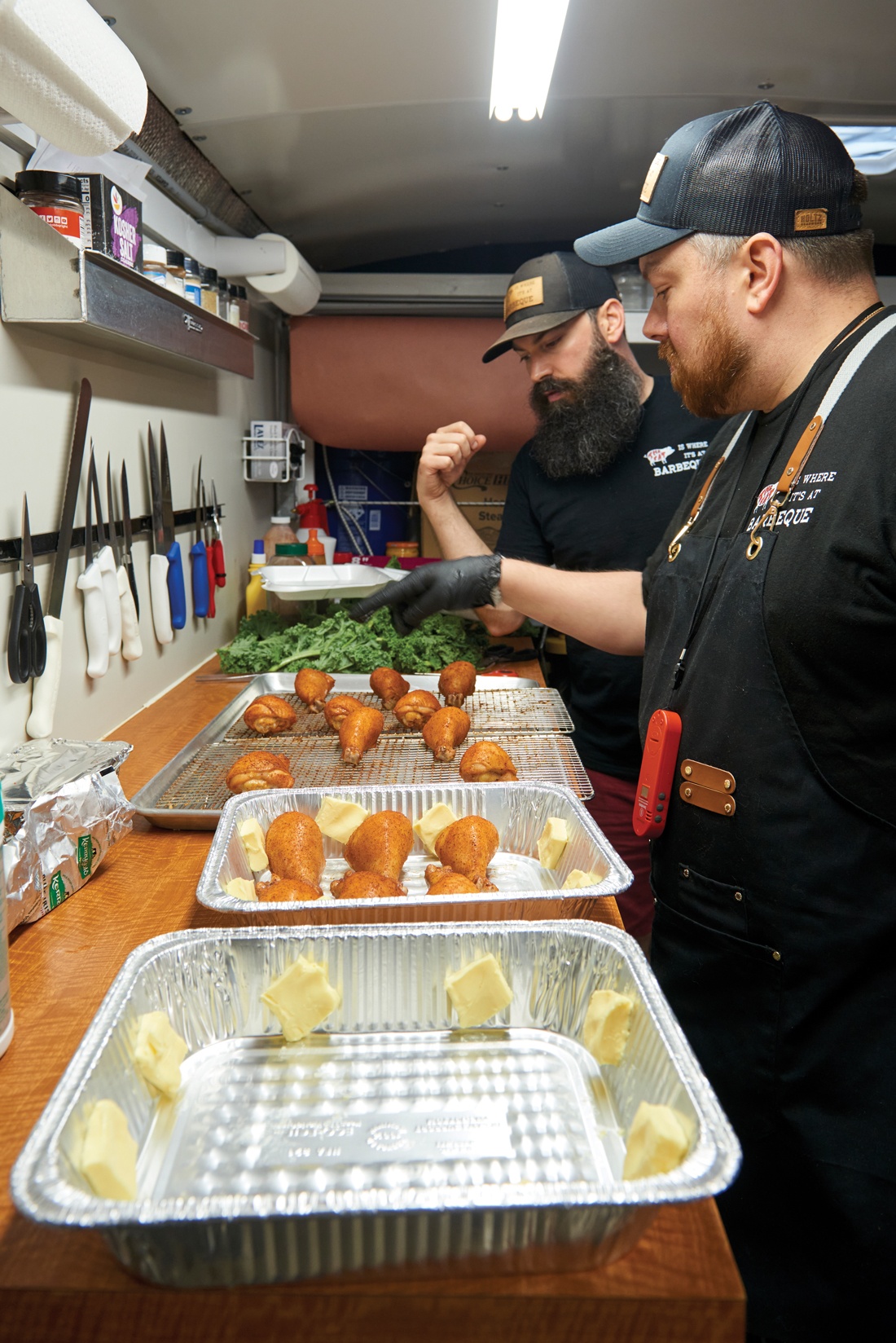
Nick Santoleri (left) and Scott Nemeth begin the process of identifying their best smoked chicken drumsticks mid-smoke, with trays of butter prepared for the next step.
By day, Scott works as a quality control manager for a tech company, while Nick is a mechanical designer. When they entered the world of competition barbecue in 2019, it started as an entertaining pastime. Their chosen name – The Fat is Where it’s At Barbeque – underscores the significance of fat’s influence on flavor and heat. Committing themselves to the competitive circuit, they outfitted an enclosed trailer to transport barbecue smokers and handle food prep. It also doubles as a camper. “Our competition season starts in March. We typically have at least one competition per month until late November, when we will be competing in the Kansas City Barbeque Society (KCBS) World Invitational,” Nick explains.
KCBS started in 1985 as a way to distribute barbecue news through a newsletter known as The Bullsheet. Thirty-seven years later, their website declares KCBS to be “the world’s largest organization of barbeque and grilling enthusiasts with over 20,000 members worldwide.” KCBS hosts two levels of competitors, the Backyard Series and Master Series; points are based on placement and field size at each competition. The Master Series teams are well-outfitted, as they are often associated with restaurants or catering businesses. The Backyard Series offers a wide range of skillsets, from first-time competitors to highly driven teams like Nick and Scott, competing as individuals or as a group throughout the country.
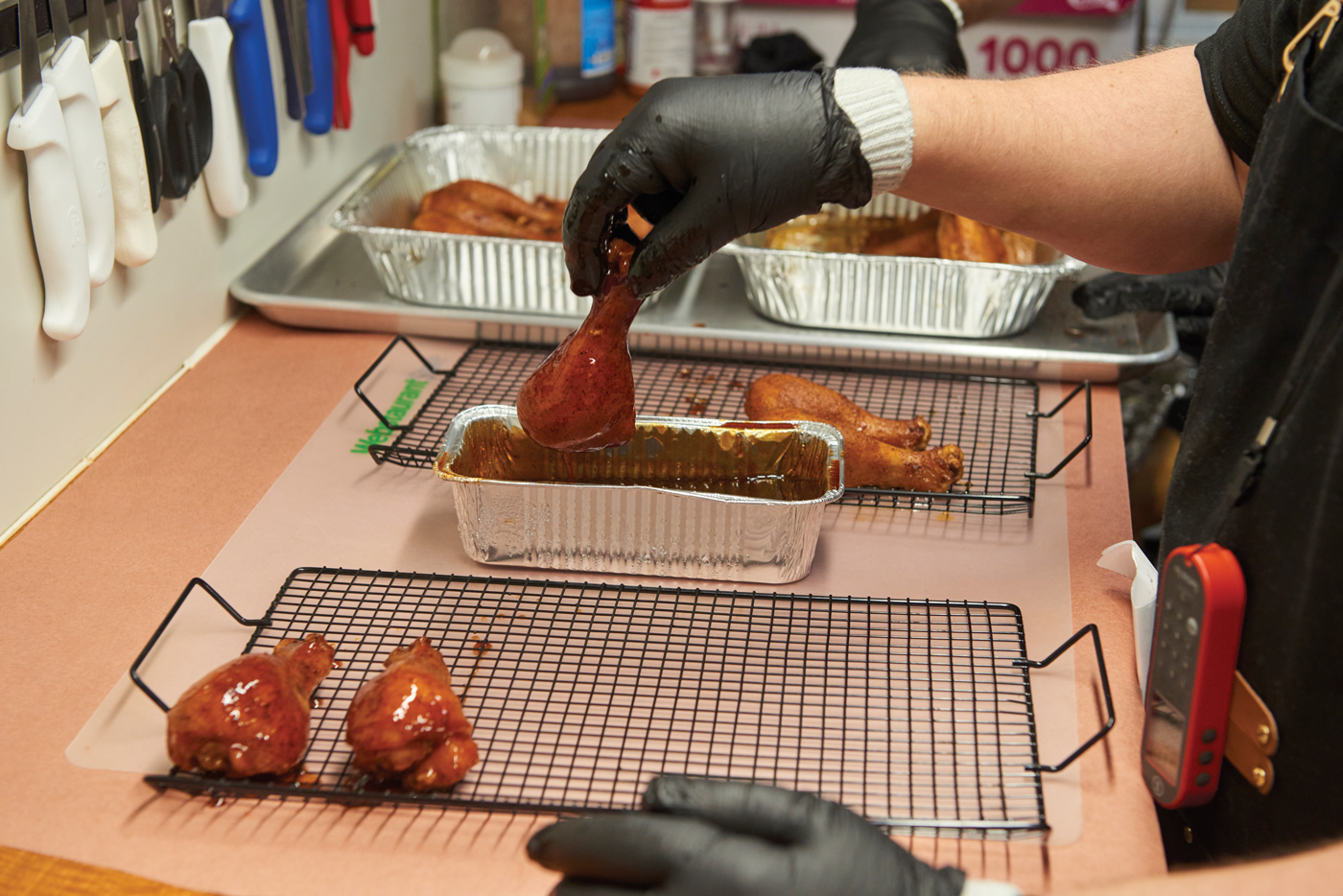
Scott hand-dips smoked chicken drumsticks in a honey-glaze sauce before returning them to the smoker to develop a deep, glass-like appearance with layers of seasoning. The dipping method provides a more consistent coating than does brushing on the seasoning sauce.
As you might notice, Nick and Scott (as well as KCBS) use “q” in the spelling of barbecue. Either spelling is correct. The word itself is traced to the Spaniards, who added the word “barbacoa” to their culinary language following their exploration of the Caribbean. Barbacoa is no doubt an interpretation of a word – barbaca – that was used by the Taino people of the Dominican Republic to describe how meat and fish are slow-cooked/smoked over an open fire or in a pit. The English began referring to the cooking technique as barbecue in the 18th century. The technique became popular in Mexico and made its way to Texas. Enslaved people in the American South also perfected the technique as a way to tenderize inferior cuts of meat, notably pork. Because of our fondness for acronyms – bar-b-q and BBQ – substituting a “q” for the “c” has become more popular.
Twin Valley Fire & Smoke BBQ Competition
Ahead of the 2022 season, Scott and Nick spent the winter practicing and perfecting new recipes and techniques. When spring arrived, Nick and Scott were ready to hit the circuit. In May, they headed for Morgantown for the annual Twin Valley Fire & Smoke BBQ Competition, a KCBS event that is hosted by the Twin Valley Fire Department.
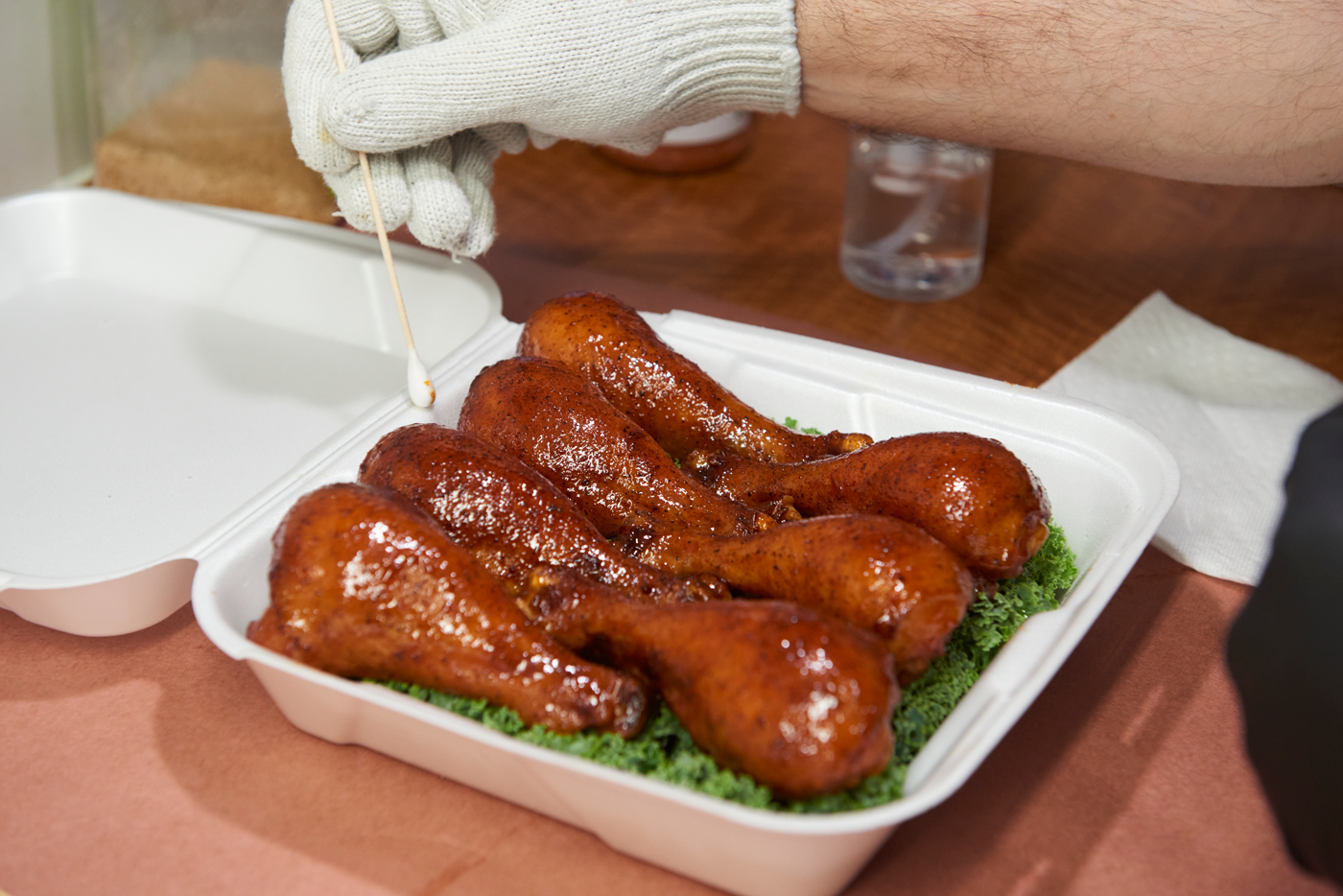
The finishing touches are applied to the entry box that Nick will carry to the judges’ table. Out of 18 chicken drumsticks that were smoked in a tray of butter and seasonings, seven of the most pristine and similarly sized drumsticks were submitted into competition.
Held at the Classic Auto Mall, a temporary village of barbecue aficionados took over the complex, filling it with rows of trailers, campers and tents. License plates represented states near and far.
Smoke and intoxicating barbecue aromas moved through the air. The field consisted of both seasoned regulars and newcomers, including newbies who had attended Nick and Scott’s chicken barbecue workshop that was held at Key-Aid Ace Hardware in Ephrata last fall. The field is competitive, but not without community. “You’re competing against yourself,” says Scott. “If you don’t win, you want to see your friends do well.”
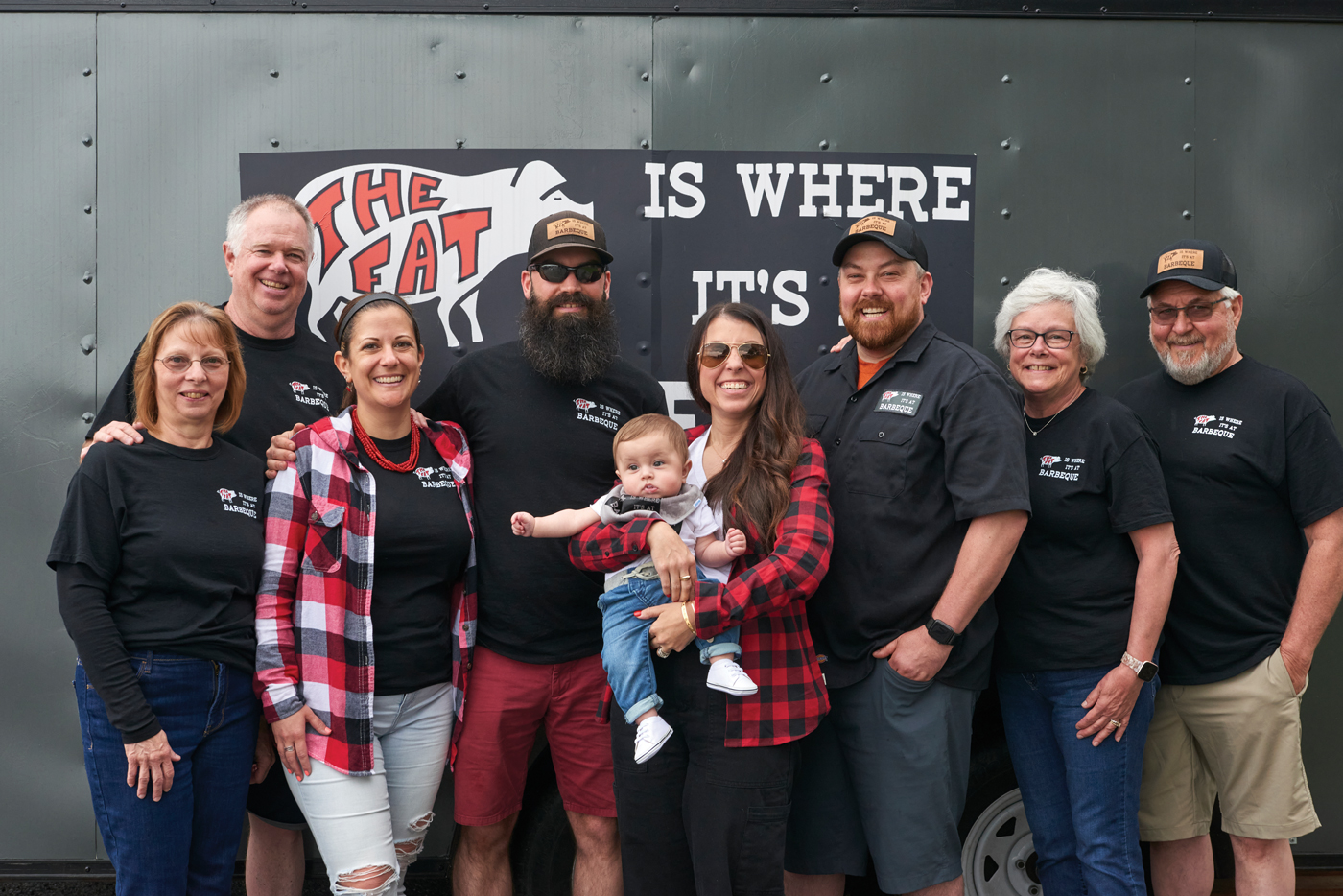
From left to right are Donna and Fran McBurney (Nick’s parents), Christina and Nick Santoleri, Maxwell Nemeth held by Krystle Nemeth, Scott Nemeth, and his parents, Sandy and Bob Nemeth.
As with any competitors, numerous traditions and superstitions are part of the preparations. Nick, for example, cracks open a cold brew once the smokers are lit at approximately 7 a.m. A few hours later, Nick skips the communal “9:22 Shot” and, while he’s not a coffee drinker, he sets up a coffee service that is free for passersby and is provided by Lancaster County Coffee Roasters. Team decals and magnets are proudly exchanged, while shirts are swapped for luck. Then there’s “Wild Child,” a buy-in awarded to the team finishing in eleventh place overall. If the eleventh-place finisher didn’t participate, the cash prize is awarded to the next participant down the list.
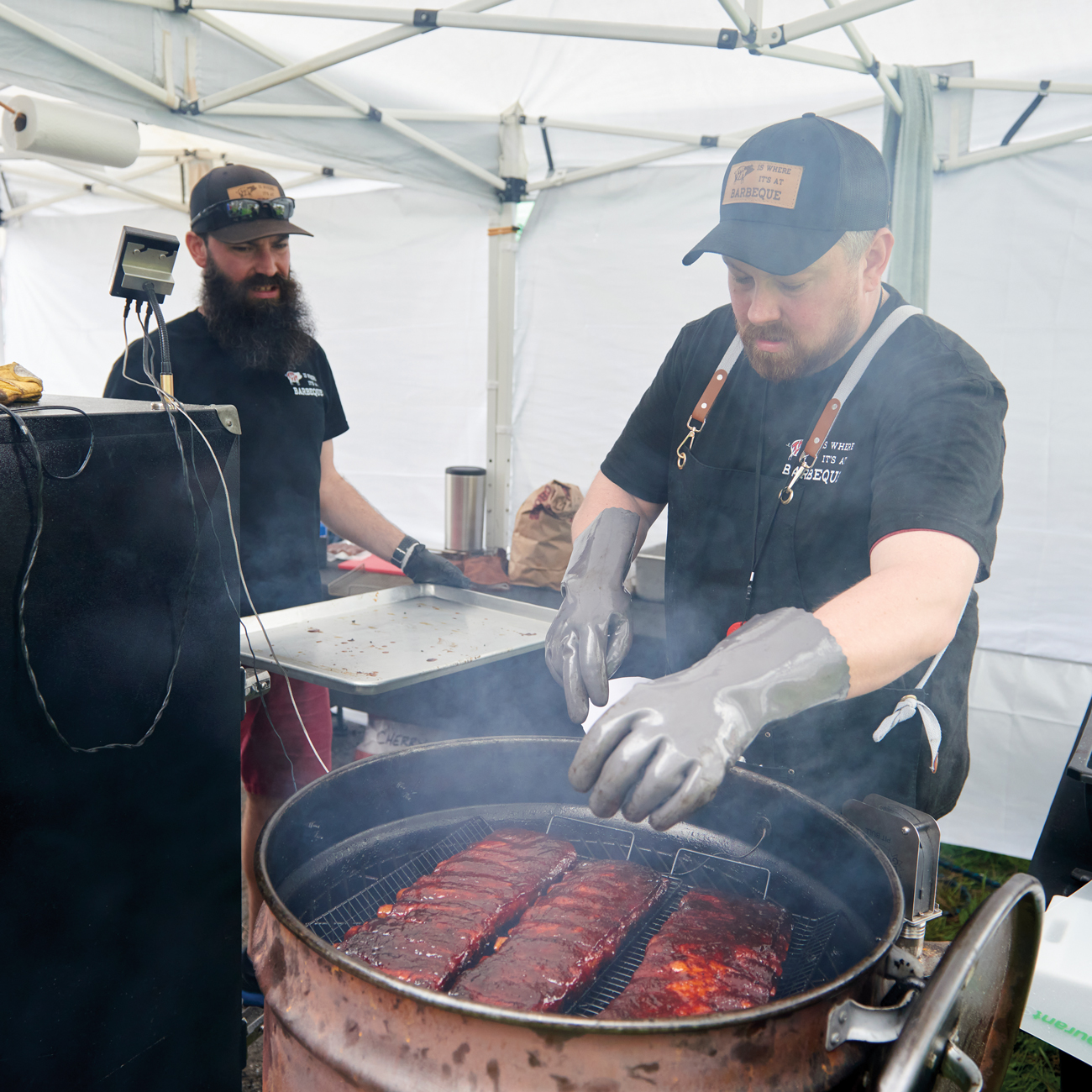
Nick and Scott check their three racks of smoked ribs on their home-made “ugly drum smoker.” UDS for short, it is a popular and versatile smoker with a perfectly seasoned interior.
In KCBS competitions, barbecue is judged on appearance, tenderness and flavor (the latter is subjective). Nick and Scott want classic barbecue flavors and strive to make their offerings well-balanced and appealing – not too hot, not too sweet – to all six judges. As clear blue smoke flows out of the smokers, minutes quietly pass into hours, interrupted by temperature checks and the addition of ingredients. Nick and Scott make adjustments on whether their chicken or ribs are over or underdone at that point in the day, based on their timeline. “We agree on everything,” says Nick. “We’re a true 50/50 team.” Nick works ahead of Scott’s focus and vice versa. Enormous pride elevates their cooking but it’s devoid of ego. That might be the “secret sauce” in how two passionate competitors work seamlessly under pressure and remain friends.
Constantly refining their processes, one phrase stands out: “Next time, what we need to …” At this competition, they’ve realized the full value of cooking on-site the day before a competition, to “knock the rust off,” says Nick. It’s an opportunity to try new recipes and seasonings, dial-in equipment and ensure everything is prepared for competition.
The Final Minutes
At Twin Valley, the Backyard Series requires two smoked entries: chicken and ribs. The stopwatch around Scott’s neck keeps the pace, running up to three concurrent timers. Nick has an uncanny sense of time, ready for the next process seconds ahead of each alarm. Working backwards, they’ve engineered a two-meal timeline, detailed to the minute, allowing for variances. All teams must submit chicken between 11:55 a.m. and 12:05 p.m. (not a second earlier and not a second later). Following the same format, ribs are submitted 30 minutes later. Those competing in the Master Series have two additional entries, pork and brisket.
As the chicken legs and ribs come off the smoker, Nick and Scott sample what they deem to be the least-presentable before and after final seasoning. Ribs are cut with a bread knife from the middle of the rack and the meat should not fall off the bone, protruding on one end. “This is a tenderness competition,” says Scott. “You gotta put in the time to make it cook right.” A gridded cutting board is used to arrange portions before boxing. A color-temperature adjustable light aids in photographing plated dishes for reference and to aid with final adjustments. Constantly calling out the clock, “We have plenty of time,” says Nick calmly, having three minutes left before needing to depart. “Details,” says Scott. “These are the things we didn’t pay attention to when we started.”
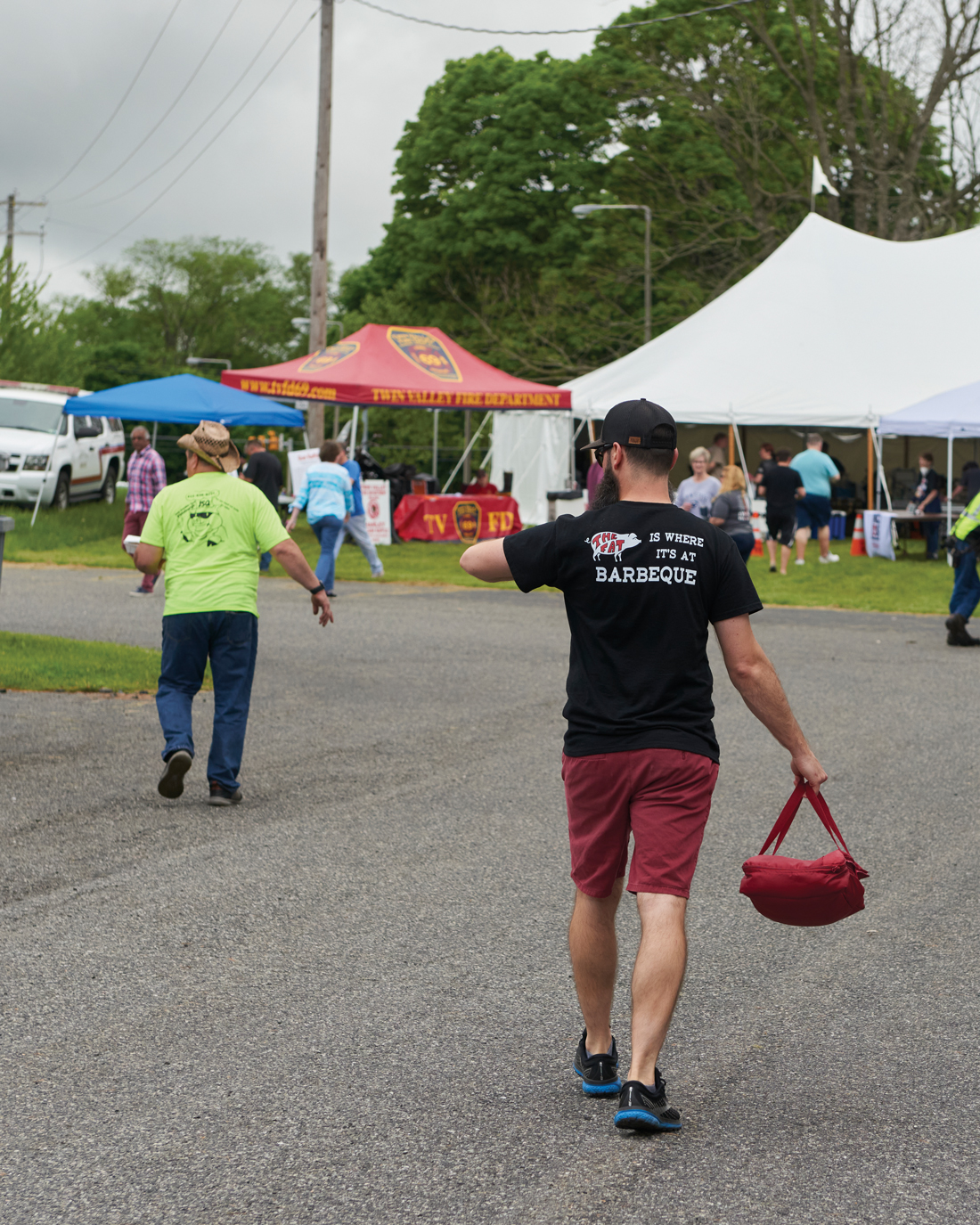
Nick checks his watch numerous times on the hurried yet careful walk to deliver their barbecue entry to the judging table. To avoid a fumbled hand-off, entrants must place their submissions on the tables where the judging staff will pick them up.
The final few minutes of each cook are the most action-packed, leading up to “the walk,” when teams turn in plated barbecue in Styrofoam containers. Presentation boxes – each containing six items for the judges to study and sample – can be styled with a bed of lettuce, parsley or kale. It’s customary to add an extra portion for the judges’ table captain. Today, Nick and Scott submit seven smoked chicken legs out of the 18 they prepared. From three full racks of ribs, seven ribs are entered.
With entries submitted, an illusionary respite is prelude to a mind-game of second-guesses until results are announced at 5 p.m. Key to the learning process, friends from other teams stop by to trade food samples, seek feedback and commiserate over the day’s struggles. Since today’s competition is close to home, Nick and Scott’s families were able to join them for a cookout and the awards ceremony.
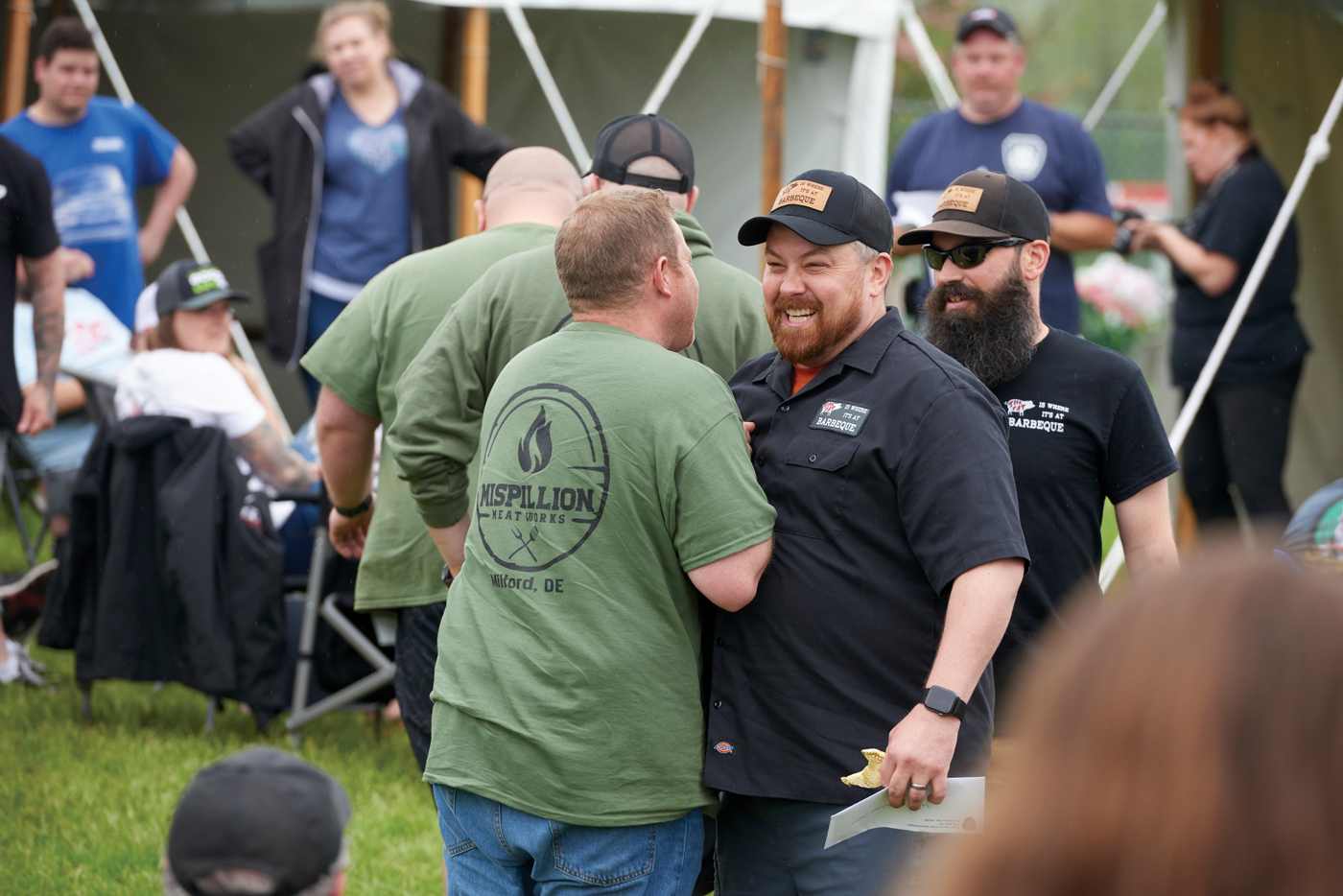
Winning Reserve Grand Champion at Twin Valley, Scott and Nick celebrate while congratulating the Grand Champion team, Mispillion Meat Works, from Milford, Delaware.
The Results Are In
In most KCBS barbecue competitions, awards are given to the top three finishers in each food category for both the Backyard and Master Series. Awards are also presented to the top two overall finishers in each series (Grand Champion and Reserve Grand Champion). The cash prizes help offset expenses, from entry fees to hundreds of dollars spent on meat. For scoring, “the difference between first through fifth places might be one point,” Scott notes. “At one competition, we came behind first place by .01 points … out of 180.” Making for a potentially heartbreaking outcome, ties are settled by a coin toss. Today, Scott and Nick felt their chicken was among their best but not their ultimate. They deemed their ribs to be on the dry side. For the rest of us mere mortals, their efforts would qualify as the best barbecue of our lives.
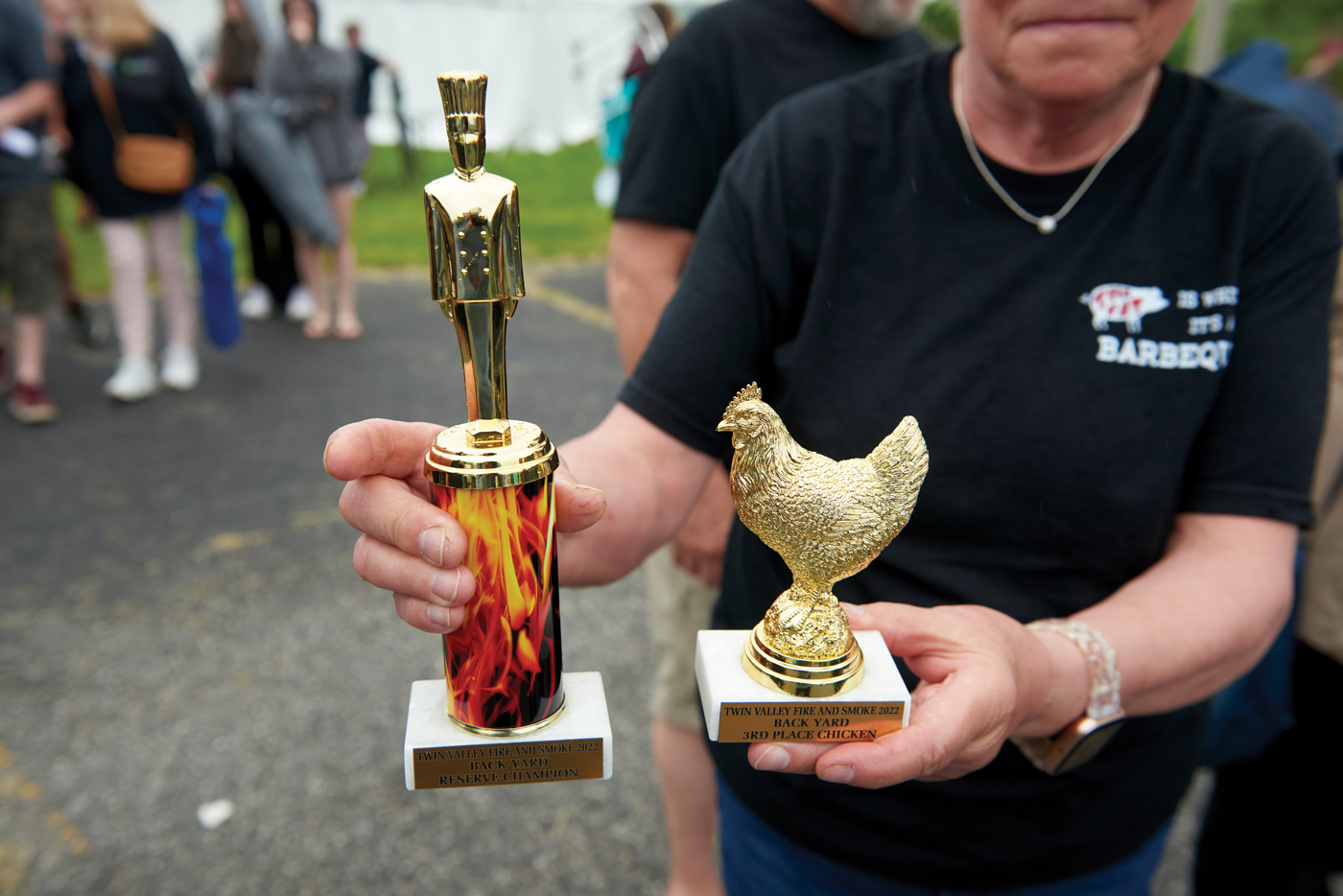
Backyard Series trophies awarded to The Fat is Where it’s At Barbeque at Twin Valley: Reserve Grand Champion and third place for chicken. They also placed fourth in the ribs category.
As it turned out, Nick and Scott were a little hard on themselves. In the Backyard Series, the judges awarded them third place in chicken and fourth in ribs. They also won Reserve Grand Champion as the second-best overall team. The finishes helped to propel them to the top of the leader board – as of May – in the national KCBS Backyard Series: first place for ribs (with 1,222 points) and second place for chicken (1,172 points). They hold similar rankings in the Mid-Atlantic BBQ Competition.
Future Ambitions
With success early in the year comes pressure to advance from Backyard to the Master Series. Where they go from here is a question they ask daily. “Our short-term goals are to be successful this year: Win the Mid-Atlantic Barbecue Association team of the year chase, do well in the KCBS’s team of the year chase, and place well at the Kansas City World Invitational. That’s the biggest event for Backyard Barbecue,” Scott shares. Nick and Scott are working to achieve these goals before advancing. They are also pondering additional possibilities, whether that could be catering, teaching or going in another direction. In the meantime, Nick will soon complete the ServSafe® Food Safety Manager Certification.
BBQ Workshops at Key-Aid Ace Hardware
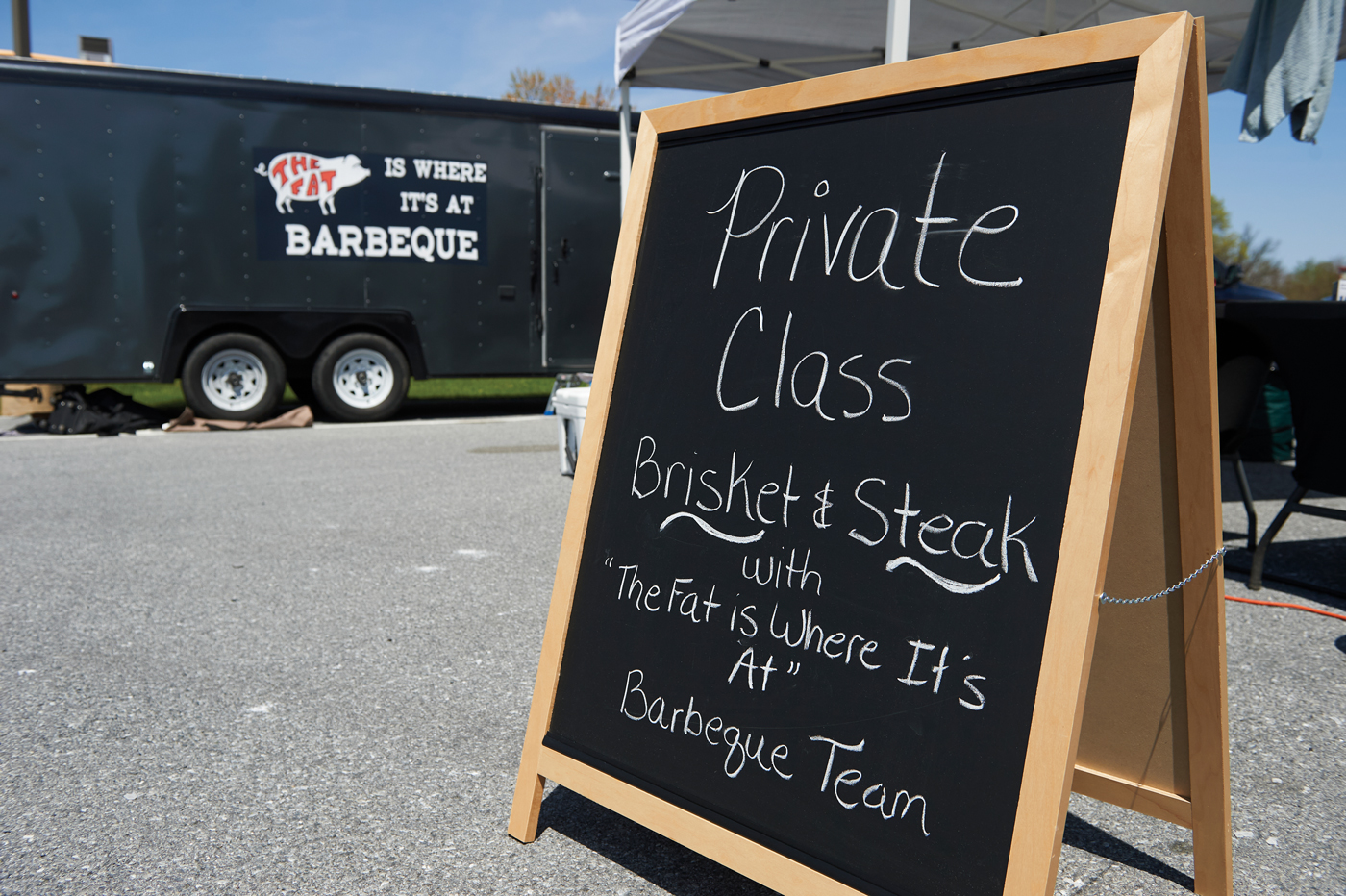
In April, Nick and Scott presented a Saturday morning brisket and steak workshop at sponsoring Key-Aid Ace Hardware in Ephrata. To prepare for the workshop, the team camped out in the Key-Aid parking lot overnight and the brisket went into the smoker at midnight. Soaked every 30 minutes in staggered shifts on a 40-degree night, their heater tripped a circuit breaker locked inside the store, yet they didn’t miss a beat.
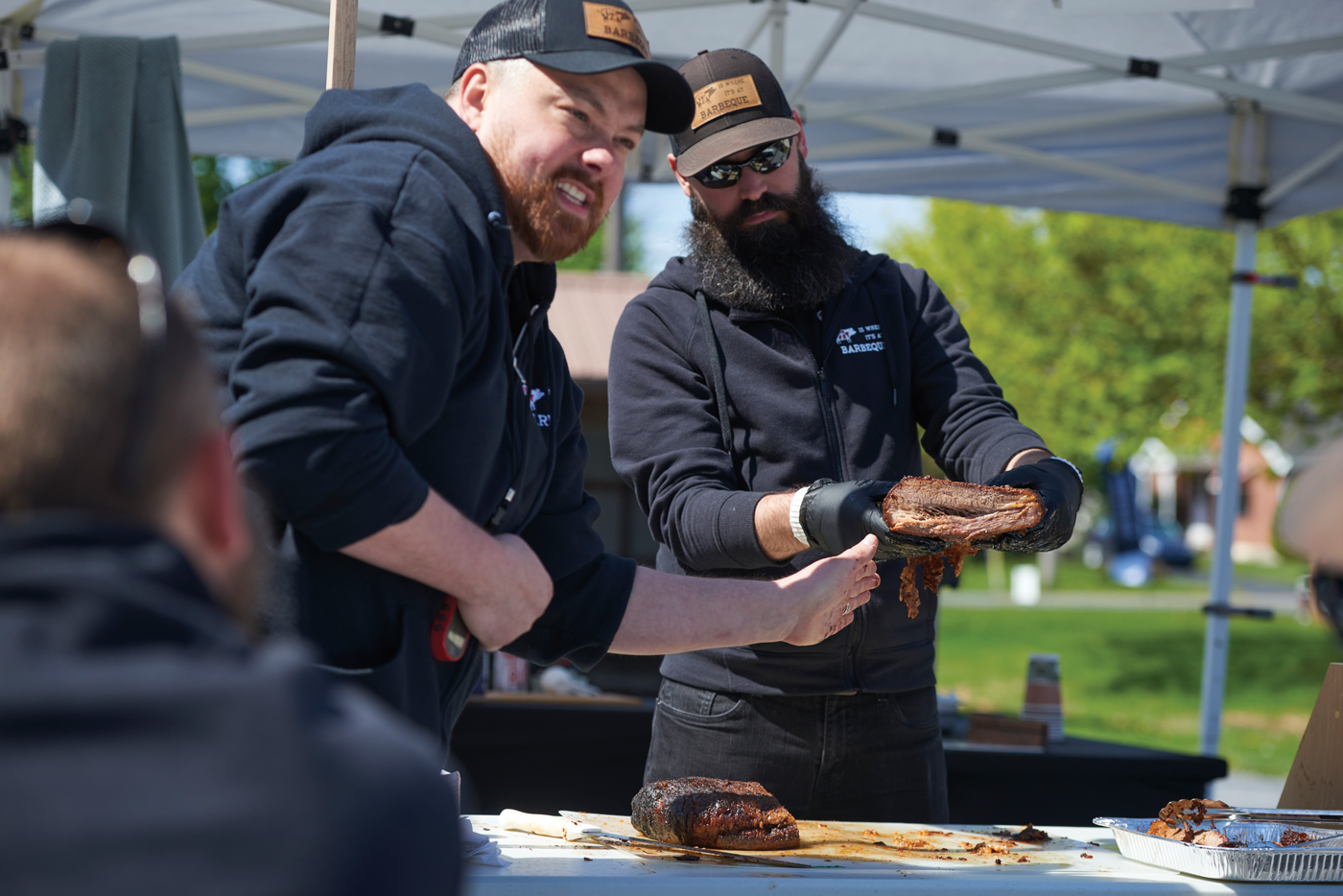
Backyard Series trophies awarded to The Fat is Where it’s At Barbeque at Twin Valley: Reserve Grand Champion and third place for chicken. They also placed fourth in the ribs category.
Taking a page out of their wives’ playbooks as educators, Nick and Scott started teaching barbecue workshops at sponsoring Key-Aid Ace Hardware in Ephrata. Co-owner Elliott Pfautz is thrilled with the team’s success and nods to the value of having Nick and Scott as resources. “We sell barbecue [supplies] year-round. This is not seasonal for us,” says Elliott, who appreciates the fact that Nick and Scott can advise him on what products to stock. As a result, Key-Aid’s selection includes smokers and grills – including Weber, Traeger and Big Green Egg – as well as an incredible selection of rubs/sauces and grilling accessories.
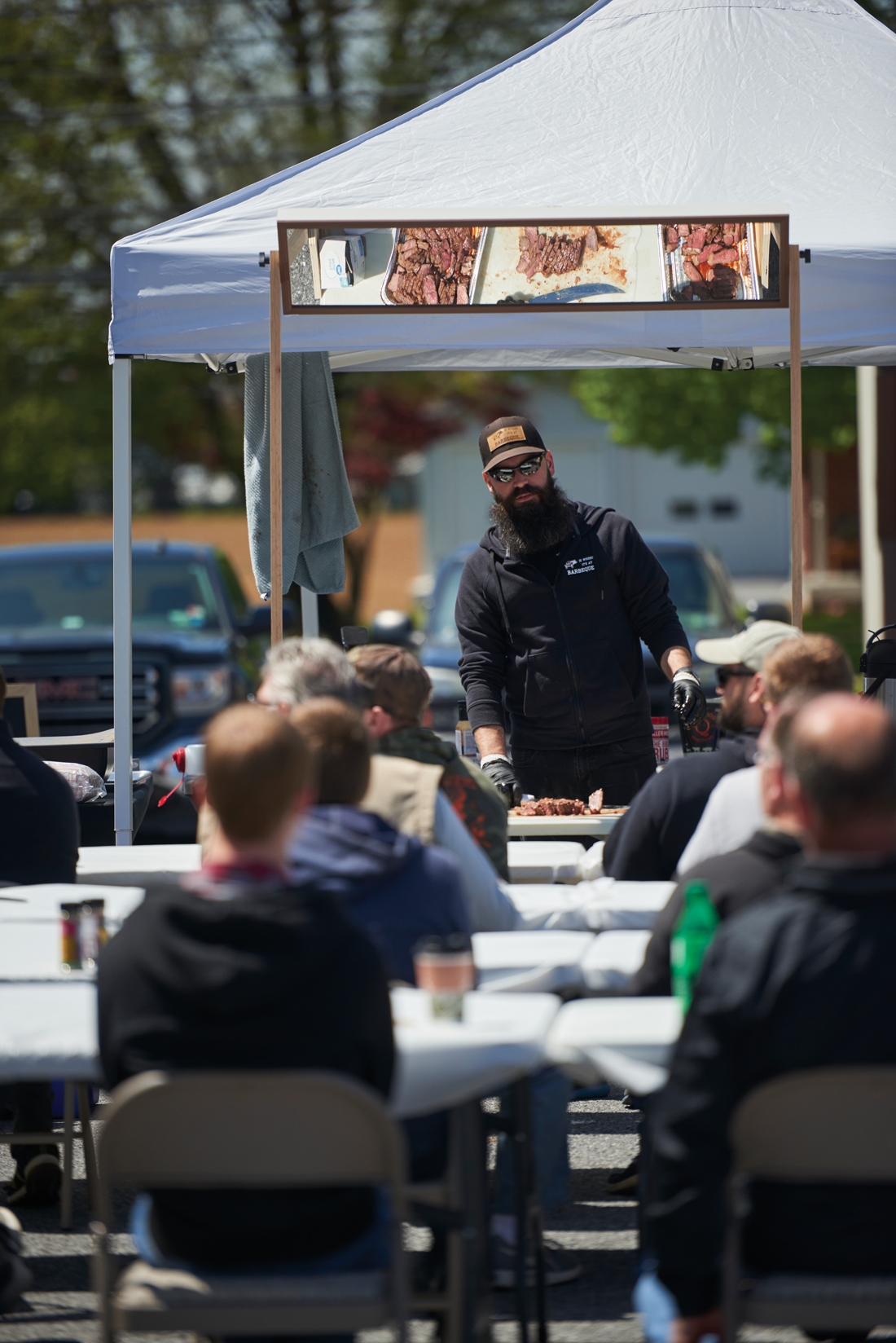
Nick discusses advantages and differences between smoked and sous vide cooking. Sous vide steak, cooked in a sealed bag in a hot water bath, reaches the perfect temperature and stays juicy ahead of an event, but isn’t as complex in flavor as smoked steak.
Follow The Fat is Where it’s At Barbeque on Instagram and Facebook
Key-Aid Ace Hardware: 1739 W. Main St., Ephrata, keyaid.com
Twin Valley Fire and Smoke BBQ Competition: facebook.com/twinvalleyfireandsmoke
KCBS: KCBS.us





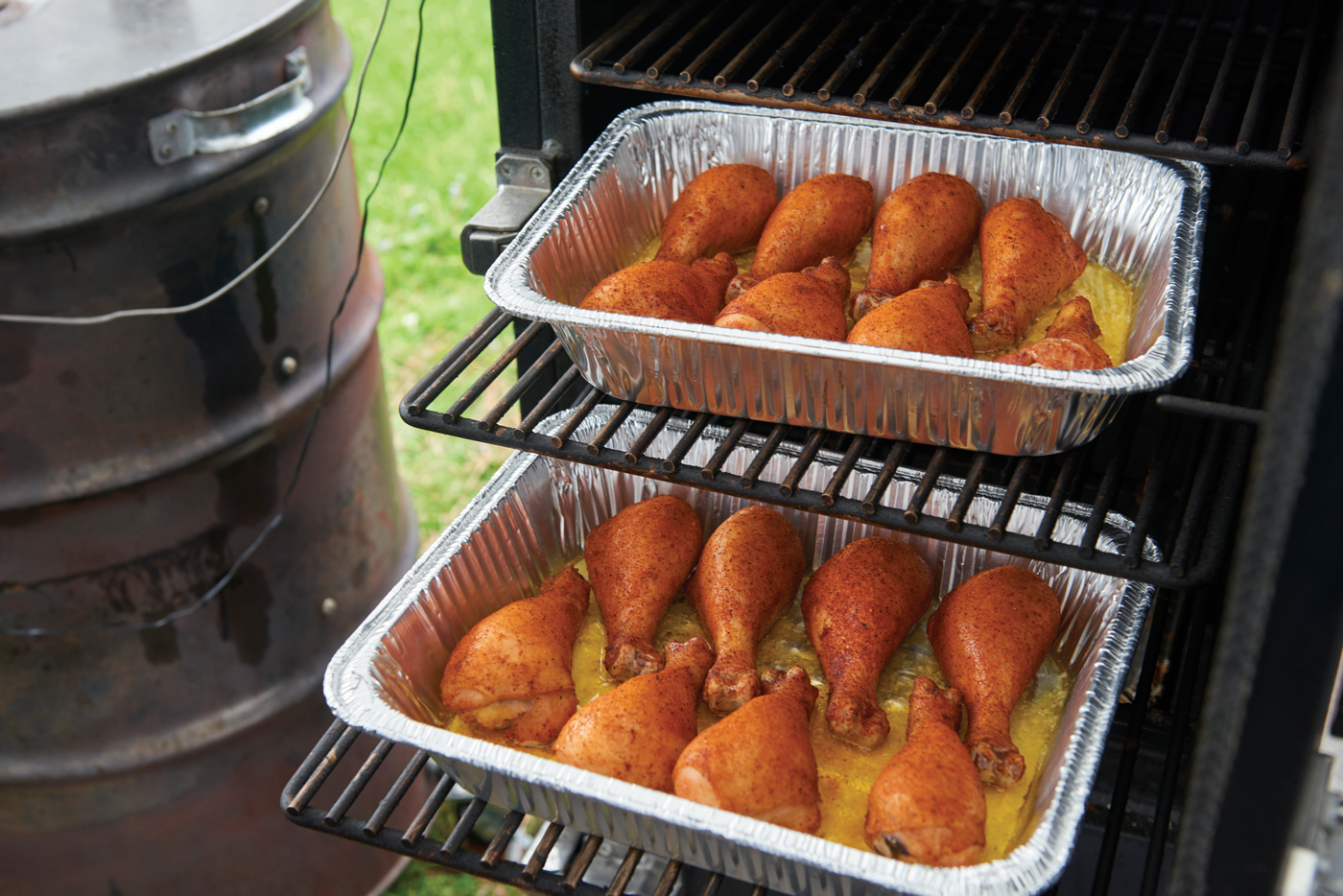
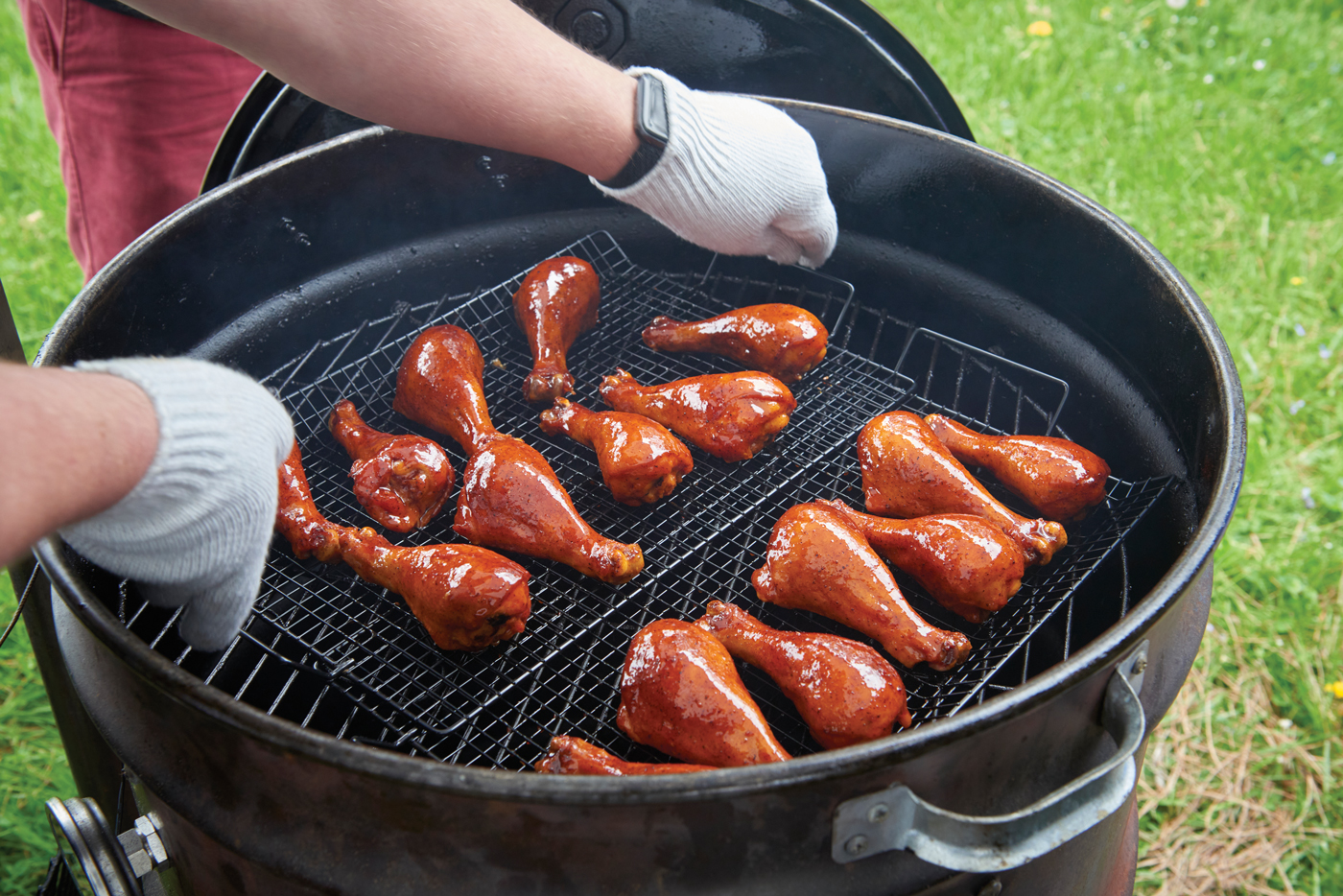
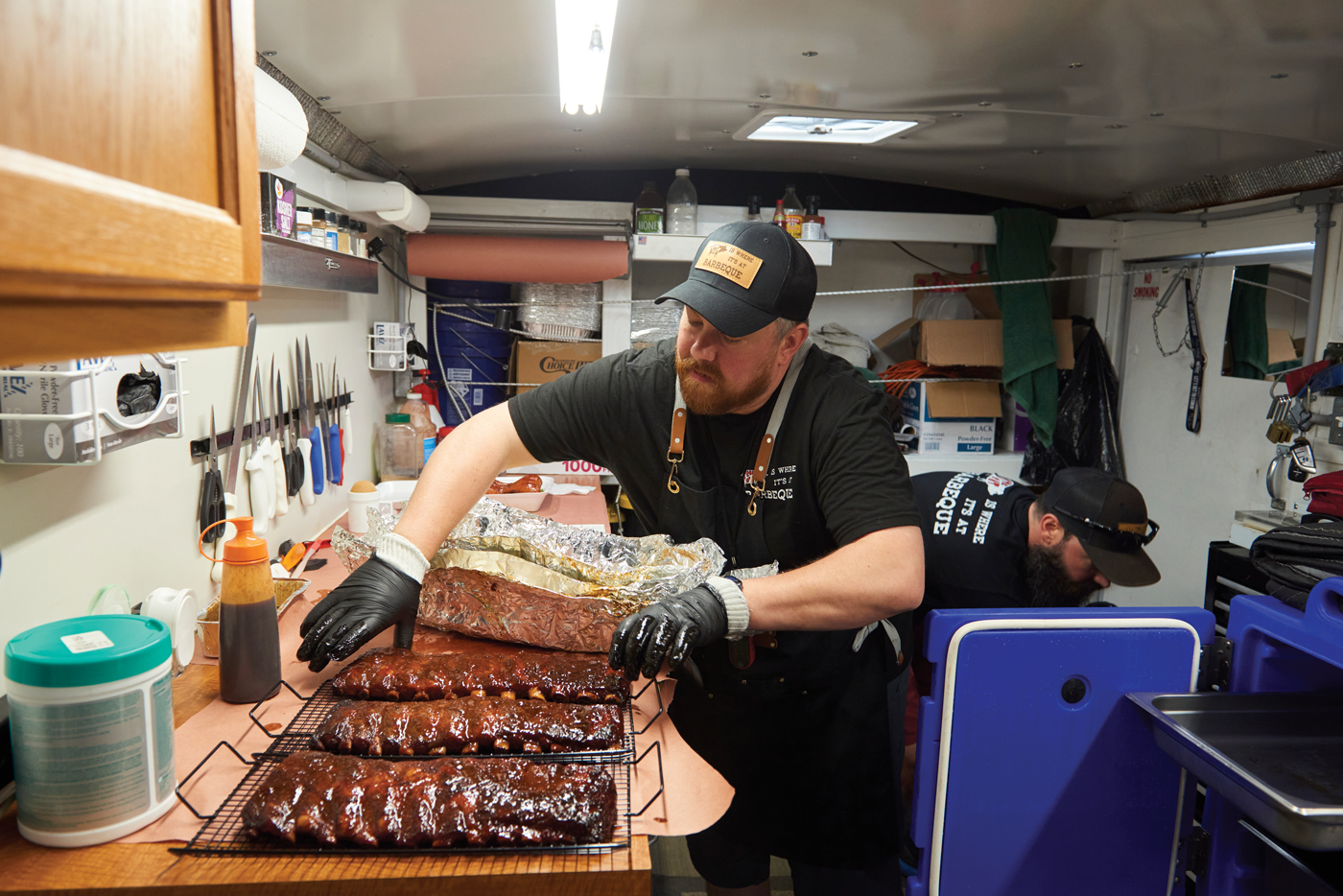
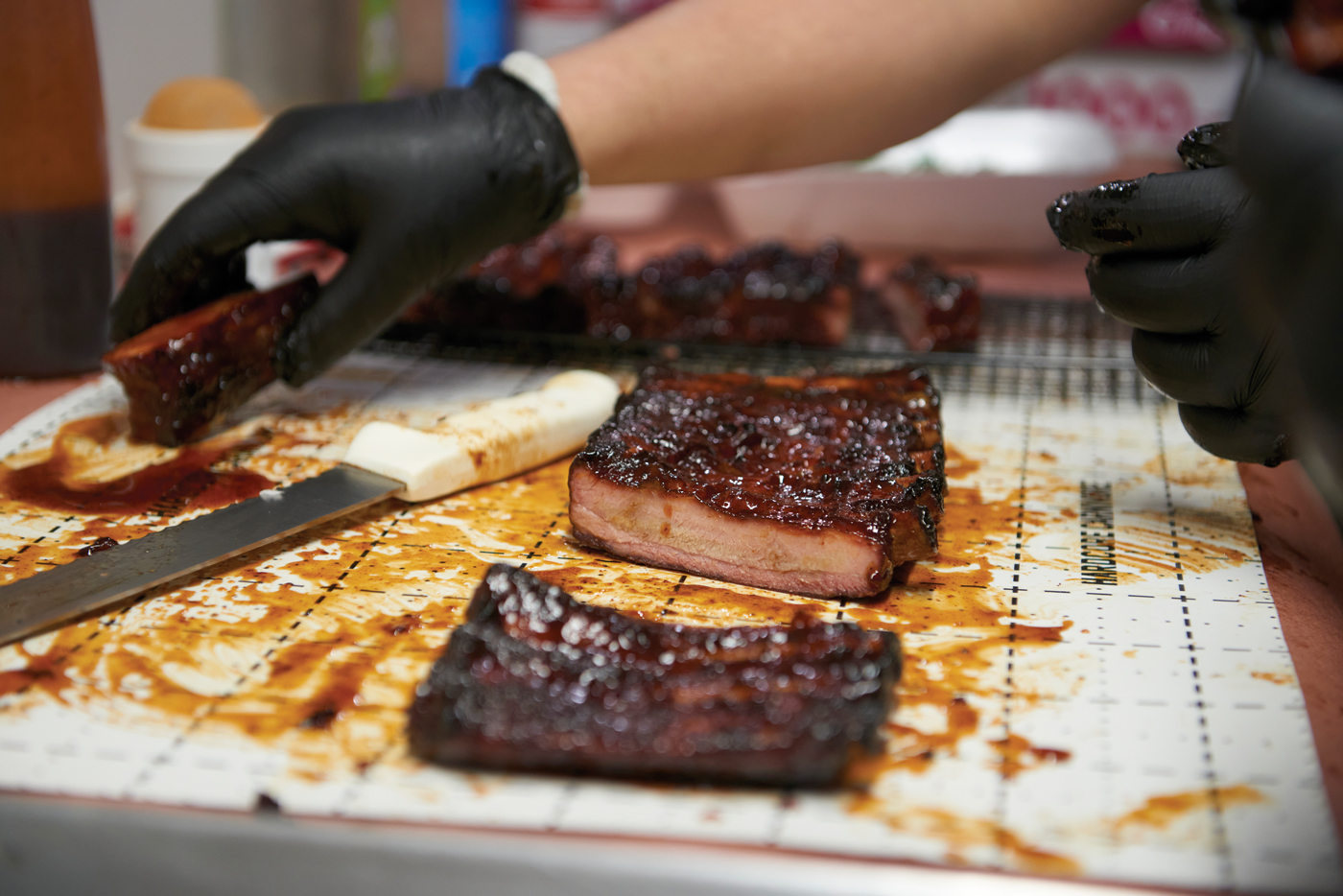
SHARE
PRINT